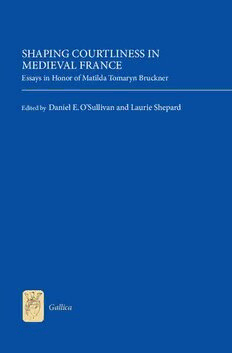
Shaping Courtliness in Medieval France: Essays in Honor of Matilda Tomaryn Bruckner PDF
316 Pages·2013·6.728 MB·English
Most books are stored in the elastic cloud where traffic is expensive. For this reason, we have a limit on daily download.
Preview Shaping Courtliness in Medieval France: Essays in Honor of Matilda Tomaryn Bruckner
Description:
The question of what medieval "courtliness" was, both as a literary influence and as a historical "reality", is debated in this volume. The concept of courtliness forms the theme of this collection of essays. Focused on works written in the Francophone world between the twelfth and fifteenth centuries, they examine courtliness as both an historical privilege and a literary ideal, and as a concept that operated on and was informed by complex social and economic realities. Several essays reveal how courtliness is subject to satire or is the subject of exhortation in works intended for noblemen and women, not to mention ambitious bourgeois. Others, more strictly literary in their focus, explore the witty, thoughtful and innovative responses of writers engaged in the conscious process of elevating the new vernacular culture through the articulation of its complexities and contradictions. The volume as a whole, uniting philosophical, theoretical, philological, and cultural approaches, demonstrates that medieval "courtliness" is an ideal that fascinates us to this day. It is thus a fitting tribute to the scholarship of Matilda Tomaryn Bruckner, in its exploration of the prrofound and wide-ranging ideas that define her contribution to the field.
See more
The list of books you might like
Most books are stored in the elastic cloud where traffic is expensive. For this reason, we have a limit on daily download.
